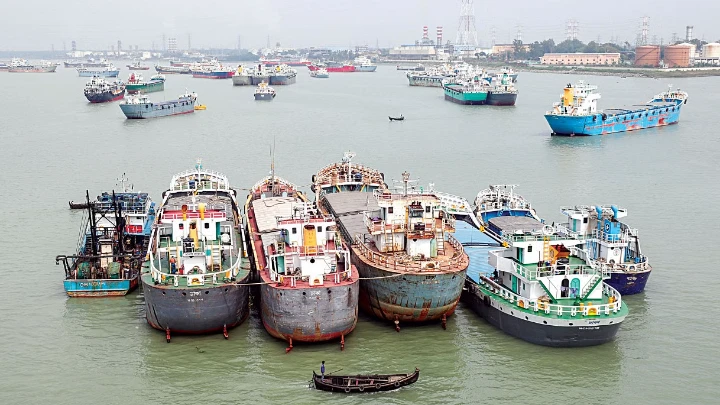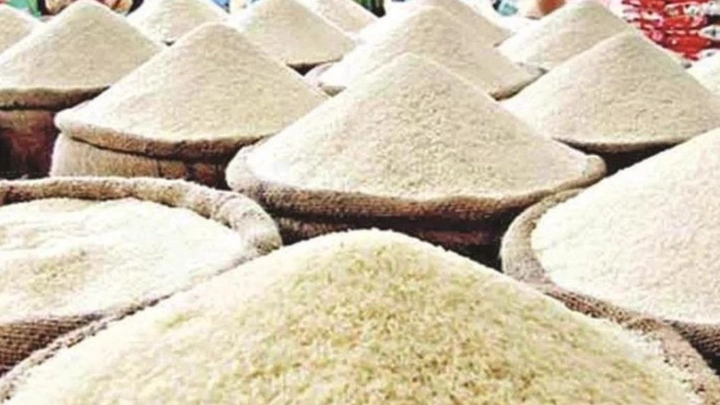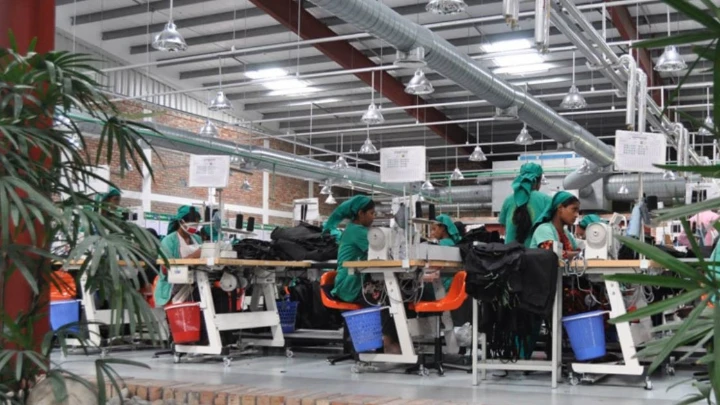30% less cargo is moving through waterways.
DailyStar || Shining BD

Cargo movement through inland waterways has decreased in recent times as ongoing difficulties in opening letters of credit leading to lower imports means there is less to carry for the vessels on river routes. The picture was taken from the Shah Amanat Bridge over the Karnaphuli river in Chattogram recently. PHOTO: Rajib Raihan
According to industry insiders, inland water cargo vessel operations in Bangladesh decreased 30% over the previous eight months as imports significantly decreased due to the ongoing Russia-Ukraine war's impact on the global economy.
It should be noted, though, that no official records exist regarding the movement of cargo ships along inland river routes.
In the current fiscal year's July to February period, $45.51 billion worth of letters of credit (LCs) were opened, down 23.45% from the corresponding period in 2021–2022.
According to data from the Bangladesh Bank, LC settlement decreased 1.22 percent over the previous year, from $52.66 billion to $52.01 billion over the course of the eight-month period.
The number of LCs opened for importing consumer goods fell by 14.53 percent to $5.49 billion at the time, down from $6.43 billion the year before, out of the total LCs issued.
Similar trends were seen in the LC opening for intermediate goods, which decreased by 30.32 percent from FY22 to FY23 to $3.60 billion from $4.60 billion, and the LC opening for industrial raw materials, which decreased by 30.05 percent to $15.55 billion from $22.24 billion.
According to Khandker Saiful Alam, owner of Max Corporation, "Cargo vessel operations have decreased 30% in the past eight months as a result of declining imports amid the restrictions on the opening LCs due to the ongoing US dollar shortage."
According to him, the primary purpose of cargo vessel operations is to transport imported raw materials for a variety of industries, which have been forced to reduce production due to challenges with LC opening.
Currently, Bangladesh has about 2,000 cargo ships that travel on inland waterways to transport goods, including those that are imported from India's neighbor.
The country's cargo vessel market has so far seen investments totaling about Tk 6,000 crore, creating about 25,000 direct jobs.
Alam stated that the slow business is not just affecting Bangladesh but also the global economy.
"Until the overall economy returns to normal, cargo vessel operations will remain subdued."
The consequences of the Russia-Ukraine war, according to Md Nurul Haque, owner of M/S Nurul Hoq Water Navigation, have made the severe losses they endured during the Covid-19 pandemic worse.
Since Bangladesh is a riverine nation, shipping goods via inland waterways rather than the road network is simpler, more affordable, and less harmful to the environment.
Haque continued by stating that although the Russian invasion of Ukraine had an effect on global supply chains, the trade restrictions and sanctions that followed had an even greater impact on the movement of cargo.
We transport imported goods to different factories in accordance with clearing and forwarding agents' orders, but the US dollar crunch prevents importers from opening Letters of Credit, which has an impact on cargo vessel operations.
In order to prevent the foreign currency reserves from rapidly depleting, the central bank has tightened regulations to deter the imports of luxury and non-essential goods. This is because the shortage of US dollars is being caused by increased import bills against decreased export and remittance receipts.
The recent increases in fuel, wage, and other costs amid rising inflation have put cargo vessel operations in hot water.
Even the imports of food grains and industrial raw materials from India via river routes have significantly decreased, said Haque.
Several shipping companies claim that in the eight months leading up to February, when only 168,074 twenty-foot equivalent units (TEUs) were shipped, container movement at Chattogram port decreased by more than 28%.
Oceangoing cargo vessel operations have decreased as a result of the global economic crisis, according to Mehrul Karim, chief executive officer of SR Shipping Ltd, a company owned by the Kabir Group of Industries.
According to him, the majority of the nation's shipping and cargo services are one-way operations that rely on imports.
Therefore, if the local cargo trade does not change, the shipping industry will not experience any improvement.
Shining BD






















